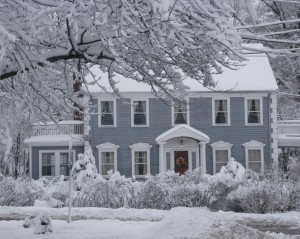
It is important to prepare your home for each season. There are many different factors that can affect your home depending on the weather. Before the winter season it is especially essential to prepare your home for the cold weather and possible snowfall.
- Clear Dead Tree Limbs
Most people forget dead tree limbs can fall and significantly damage your home. These branches can damage your roof, siding, gutters, porch, decks, and even your cars. It is important to cut these branches down before strong winds knock them down. - Weatherproof Your Plumbing
Ensure that your pipes are properly insulated and won’t To weatherproof the entire exterior of your home, shut off all external water sources like hose spigots or sprinkler systems. Cover the outdoor components of your air conditioner or swamp cooler as well to save them from the harsh winter elements. - Seal Leaks
Before the winter brings snow, make sure that all your shingles are securely fastened, especially around your chimney, flues, windows, or other openings. Keep an eye on places in your home that could be damaged by ice. Caulking cracks in the foundation and installing weather stripping will also help to protect your home from the unpredictable elements. - Inspect Your Chimney
Before using your fireplace this winter, make sure to call a chimney sweep to inspect your chimney and clean out previous soot that still may be inside. An uncleaned fireplace is a dangerous fire hazard. - Home Energy Audits
Home energy audits use specialized equipment to inform you of potential trouble areas of your home. A home energy audit can help make your home more comfortable throughout the winter and keep it working in an energy efficient manner, saving you money while keeping you warm. Home energy auditors could suggest anything from installing additional insulation to replacing poorly performing appliances. - Research Winter Rebates
The American Recovery and Reinvestment Act of 2009 was created to put billions of dollars into helping homeowners make their homes more energy efficient. This act has led several states and utility districts to offer rebate programs and other incentives to help you conserve energy. Find out if your home state offers a stimulus package. - Radon Testing
Radon is an invisible and odorless gas that is the second leading cause of lung cancer. The winter season is the best time to conduct this sort of testing because of the lack of outside air being released into your home. You can purchase your own test kit at any local hardware store or hire a professional to conduct this sort of test for you. - Check Carbon Monoxide Detectors
Before the winter season starts, replace the old batteries in your carbon monoxide detector. If your home furnace hasn’t been inspected recently, this is highly suggested as a broken furnace can release CO into your home. My Alarm Center home security systems offer a carbon monoxide monitoring system that will text you the levels of CO in your home. This system alerts emergency authorities as soon as carbon monoxide becomes a problem. - Check For Mold
The winter season is the most common time for mold to form. It can worsen allergies and cause asthma attacks while compromising the human immune system. Mold forms near water sources, so be sure to check within the bathroom and basement. By preventing leaks, you are also preventing mold from forming. - Program Your Thermostat
Throughout the winter season, make sure your thermostat is on a programmed schedule. This will save money by turning heat on and off in response to occupied rooms. My Alarm Center offers a home automation system that allows you to remotely control your thermostat, which is convenient and helps save energy.
Before the winter season starts, make sure your home is prepared to take on the cold. Check the exterior, save money on energy, be prepared for leaks, and take precautions before a disaster hits. Prepare your home and your family for the inevitable snowy months.
